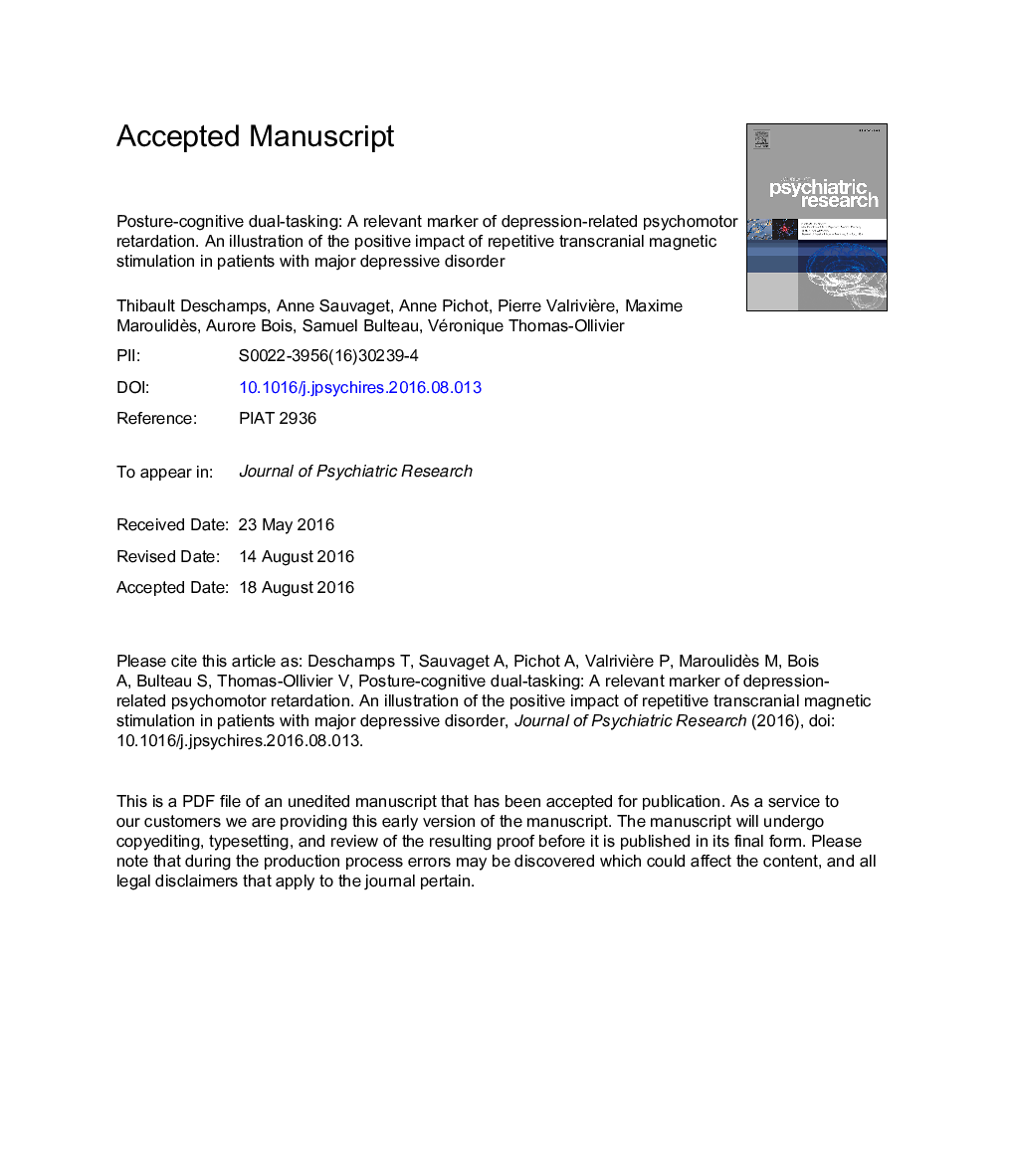| کد مقاله | کد نشریه | سال انتشار | مقاله انگلیسی | نسخه تمام متن |
|---|---|---|---|---|
| 6799809 | 862791 | 2016 | 29 صفحه PDF | دانلود رایگان |
عنوان انگلیسی مقاله ISI
Posture-cognitive dual-tasking: A relevant marker of depression-related psychomotor retardation. An illustration of the positive impact of repetitive transcranial magnetic stimulation in patients with major depressive disorder
ترجمه فارسی عنوان
دوازده وظیفه مضاعف شناختی: نشانگر مربوط به عقب ماندگی روانگردان وابسته به افسردگی است. یک تصویر از تاثیر مثبت تحریک مغناطیسی تکراری مغزی در بیماران مبتلا به اختلال افسردگی عمده
دانلود مقاله + سفارش ترجمه
دانلود مقاله ISI انگلیسی
رایگان برای ایرانیان
کلمات کلیدی
موضوعات مرتبط
علوم زیستی و بیوفناوری
علم عصب شناسی
روانپزشکی بیولوژیکی
چکیده انگلیسی
This study examined whether postural control variables, particularly the center-of-pressure (COP) velocity-based parameters, could be a relevant hallmark of depression-related psychomotor retardation (PMR). We first aimed at investigating the interplay between the PMR scores and the COP performance in patients with major depressive disorder (MDD), as compared to age-matched healthy controls; secondly, we focused on the impact of a repetitive transcranial magnetic stimulation (rTMS) treatment on depression, PMR scores and postural performance. 16 MDD patients, and a control group of 16 healthy adults, were asked to maintain quiet standing balance during two trials with or without vision, and while backward counting (dual task). All the position and velocity-based COP variables were computed. Before and after the rTMS session (n eligible MDD = 10), we assessed the depression level with the Montgomery-Asberg Depression Rating Scale (MADRS), the PMR scores with the French Retardation Rating Scale for Depression (ERD), and postural performance. Before the treatment, significant positive partial correlations were found between the pre-ERD scores and the velocity-based COP variables, especially in the dual-task conditions (p < 0.05). In contrast, there was no significant correlation between the post-ERD scores and any postural parameter after the treatment. The MADRS and ERD scores showed a significant decrease between before and after the rTMS intervention. For the first time, the findings clearly validated the view that the assessment of postural performance - easy to envisage in clinical settings-constitutes a reliable and objective marker of PMR in MDD patients.
ناشر
Database: Elsevier - ScienceDirect (ساینس دایرکت)
Journal: Journal of Psychiatric Research - Volume 83, December 2016, Pages 86-93
Journal: Journal of Psychiatric Research - Volume 83, December 2016, Pages 86-93
نویسندگان
Thibault Deschamps, Anne Sauvaget, Anne Pichot, Pierre Valrivière, Maxime Maroulidès, Aurore Bois, Samuel Bulteau, Véronique Thomas-Ollivier,
